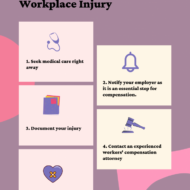Posted by Managementguru in Employee Safety, Human Resource, Labor Management, Productivity
on Jan 14th, 2022 | 0 comments

When you’re at work, your mind’s focused on the job at hand. You’re confident that your employer has thought through how to keep you safe and free from harm, which gives you the confidence to focus fully on whatever your role entails. That’s why it’s so shocking when workplace injuries do occur: you simply don’t expect them. If you work in a place with heavy machinery or other dangerous equipment, accidents and injuries can be incredibly severe. Regardless of your injury’s severity, here’s what you ought to do after an injury in the workplace. Medical Check-Up First on your list of priorities is checking yourself for injuries. It might be blatantly obvious that you have cut your arm, but you’ll only know whether that cut will result in nerve damage or other complications if you go to the hospital and speak with medical professionals. Meanwhile, other injuries – like a slip on wet tiles – can leave you with hidden injuries, like concussion or an ankle sprain. In these cases, a doctor is paramount, given that only they can help diagnose and treat all of your injuries. Time Off If your injury is causing any kind of pain or suffering, and you feel that you’re unable to recover while at work, you should immediately inform your employer that you intend to take time off. Struggling back into work before you’re ready can hamper your recovery and may actually be detrimental to the work you do for your firm, too. Given that your injury took place in your place of work, it’s likely that your leave will be paid, and your managers will fully understand why you’re taking some time off to recover. A doctor’s note may be required – but that’s simple to present after your check-up. Compensation Options If your injury was relatively severe, it’s likely that at least one manager in your firm will be wringing their hands, expecting a tribunal or a lawsuit. In these cases, you might be approached with a settlement deal – but that’s not worth accepting right away. You should first speak to experienced injury attorneys like those found at Kampf, Schiavone & Associates. They’ll know if the amount offered is too low – and they’ll advise you on how you may be able to receive a significantly larger sum of cash through their legal assistance. Returning to Work Eventually, with your legal case ongoing or completed and your recovery well underway, you’ll feel like it’s time to head back to work. Depending on the nature of your injuries, you may feel a little concerned about returning to work in the place that caused so much pain and suffering for you. Contact managers and your HR team if this is the case, as they may be able to find you work that’s not directly involved in the area that you sustained your injury. If you experience any discrimination when you return to work, do mention this to your legal team, or mention it to a trusted senior colleague. Recovering from a workplace injury can take time, but you’ll get the compensation you deserve with the right...


